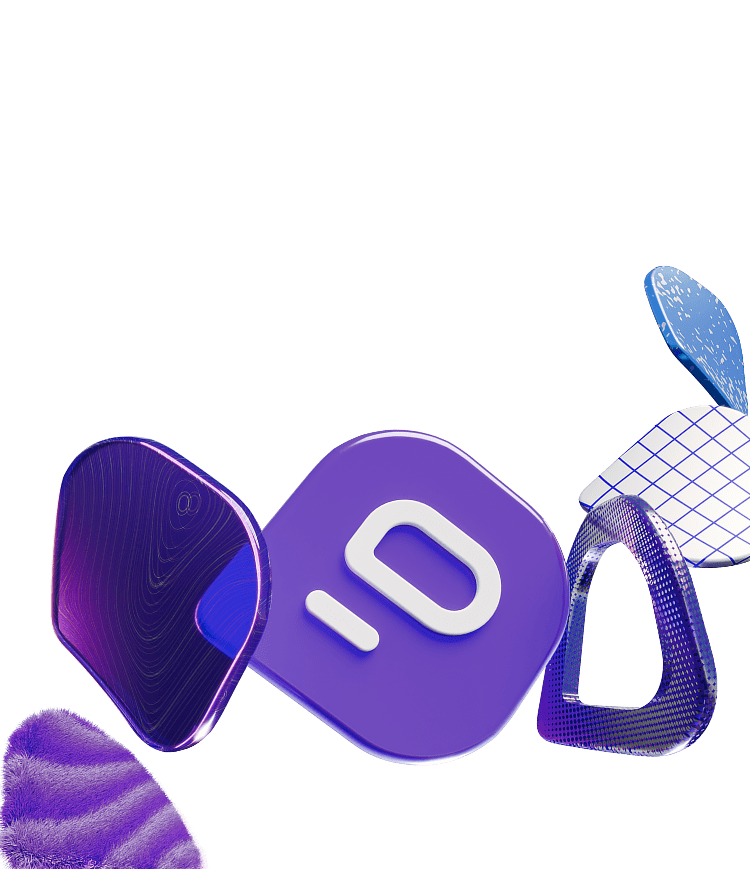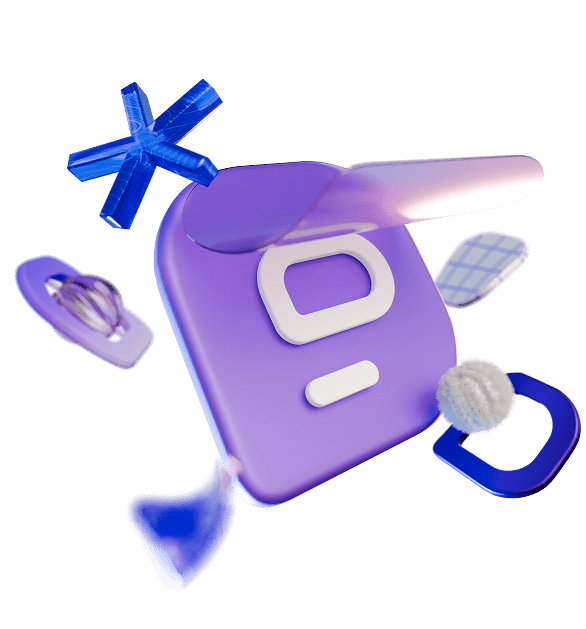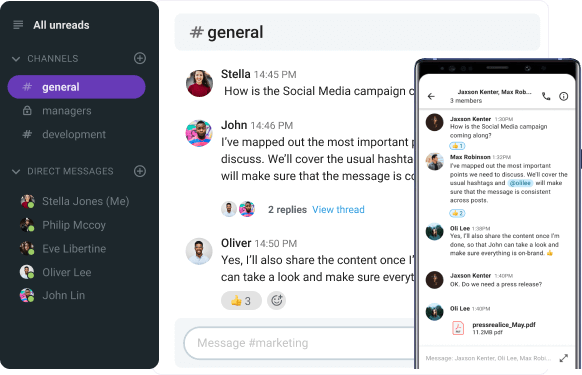When people talk about staying connected online, two names pop up over and over — Discord and WhatsApp.
On the surface, they’re both messaging apps. But the way they’re built and the role they play in people’s digital lives could not be more different.
Discord is a community hub — a place where groups of people gather, conversations branch into channels, and entire online communities are organized under one roof.
WhatsApp, on the other hand, thrives on simplicity. It’s the everyday go-to for personal, direct messaging — a fast, reliable line of communication between family, friends and close contacts.
The one thing they have in common is that they were not built specifically for business communication.
I tested Discord vs WhatsApp to find out how they compare for your business needs.
So, keep reading to find out more about the key differences in Discord vs WhatsApp for business communication and what you should choose for your team.

Why trust us?
Human reviewers try out each app and follow strict guidelines while writing about the comparisons. We follow a transparent, clear, and systematic methodology, so that every review is objective and accurate.
Discord vs WhatsApp: Who are they for?
Before diving into features, it’s worth exploring more into who each platform really serves.
Discord started life as a gamer’s communication tool, but over the years, its functionality has expanded to host communities of every kind — creators, nonprofits, study groups, open-source projects, and yes, businesses.
Its appeal lies in the server-based structure, which makes it possible to manage large, ongoing conversations across multiple topics.
For companies, this translates into the ability to create digital workspaces where different teams can all collaborate without stepping on each other’s toes.
WhatsApp, by contrast, is built for personal, direct messaging — and it shows.
Its largest user base consists of friends and families, but it has also become indispensable for small businesses, freelancers, and customer-facing teams that need a fast, universal way to connect.
With over 2 billion users worldwide, it’s often the default choice simply because everyone already has it. For teams that prioritize speed over structure, WhatsApp is the familiar, no-training-required solution.
So, while Discord draws in communities and businesses who want organized group communication, WhatsApp thrives as a tool for personal and small-team conversations.
For a tool built for your business — try Pumble!
Discord vs WhatsApp: Main features comparison
The main differences between Discord and WhatsApp are the user interface, group management features, and the pricing plans.
In the table below, we can see and compare the main features of Discord and WhatsApp:
| Features | Discord | |
|---|---|---|
| Pricing | – Free plan – Nitro Basic: $2.99 per user per month – Nitro: $9.99 per user per month | – Free – WhatsApp Business API: cost calculated by message |
| User interface | Somewhat overwhelming for first-time users | Simple and intuitive |
| Communication features | – Instant messaging – Audio calls – Video calls – Screen sharing | – Instant messaging – Audio calls – Video calls – Voice messages |
| Group management | – 250,000 thousand text channel members – Up to 99 voice channel members – Up to 25 video call participants | – Up to 1024 channel members – Up to 32 participants in voice and video calls |
| File sharing and storage | – Unlimited storage – 8 MB file size limit for free – 500 MB file size limit paid | – No storage – 2 GB file size limit |
| Search options | Advanced | Standard |
| Notifications | Advanced customization | Standard customization |
| Support | Standard | Standard |
| Security | Standard | Advanced |
We’ve gone over what these two apps were initially built for, and their main features and differences.
Now, let’s compare the features of these two apps in more detail.
Discord vs WhatsApp: WhatsApp is generally more affordable, but pricing is highly conditional
Discord keeps things simple on the free plan — you get servers, channels, voice and video calls, and basic file sharing at no cost.
But if you want more, there are two paid tiers:
- Nitro Basic — $2.99 per month. That gives you higher upload limits (50 MB) and a few expressive extras like custom emojis.
- Nitro — $9.99 per month, including 500 MB uploads, HD video streaming, custom profiles (nicknames, avatar banners), and two free server boosts.
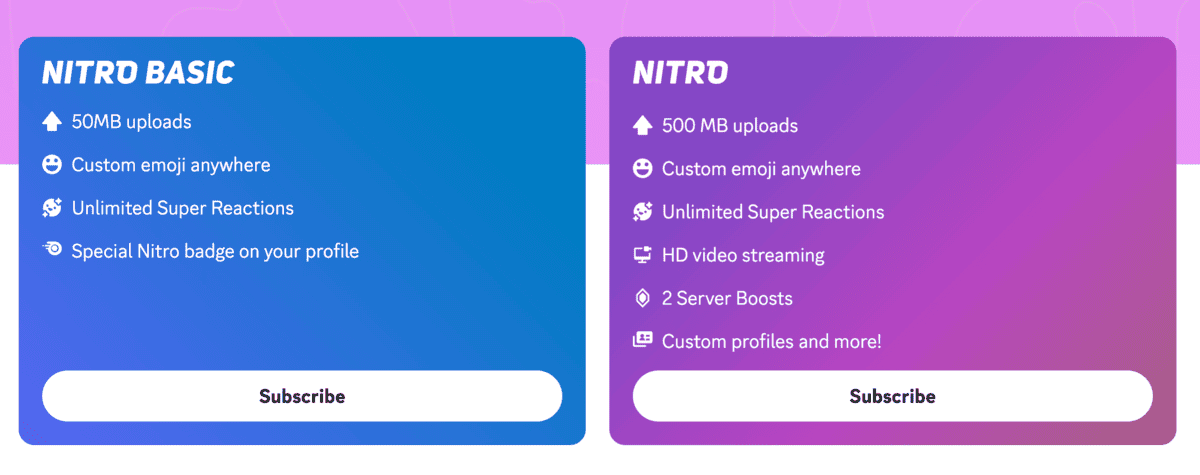
These extras are nice, especially if you share large files or want polish — but for business communication, I found the free tier already covers most essentials. Nitro is more of a premium add-on than a necessity.
💡 Pumble Pro Tip
For a full breakdown of Discord’s pricing plans for 2025, follow the link below:
WhatsApp’s basic personal and Business App is free, which alone makes it accessible for small teams and client communications.
But for enterprises using the WhatsApp Business API, pricing has become more complex and variable, depending on message type and volume.
As of July 1, 2025, Meta shifted from conversation-based billing to per-template message pricing:
- Service conversations (when a customer initiates) are now free — no charge for unlimited inbound chats.
- Utility messages (order status, confirmations) are also free within the 24-hour customer service window, but billed individually when sent outside that window.
- Authentication messages (like OTPs) and Marketing messages are always billed per message, regardless of timing.
Pricing varies by region, but as a reference — for North America, utility/authentication messages may cost around $0.004 each, while marketing messages can run around $0.025 each.
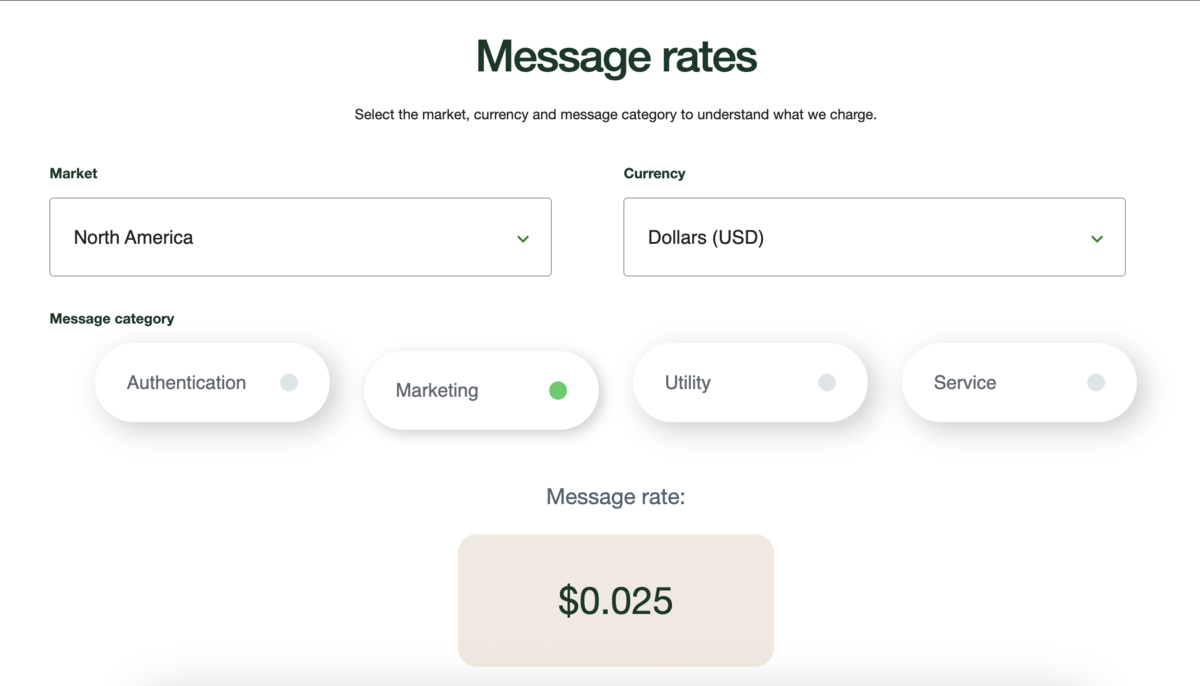
If your business relies on high volumes of proactive messaging — especially for marketing or notifications — the API costs can scale quickly, unless you’re strategic about timing and message volume.
In short — Discord gives you straightforward, predictable pricing — free works, and Nitro enhances it.
WhatsApp’s API is free for inbound chats but gets costly if you’re sending many outgoing messages, especially outside customer engagement windows.
For a free alternative to Discord and WhatsApp, try Pumble
Discord vs WhatsApp: Discord’s interface can be overwhelming
The interface of each app defines how a team experiences communication.
Discord is structured around servers, which act as hubs for activity.
Within each server, you can create channels dedicated to specific topics — one for client updates, another for product development, another for HR announcements. This system mirrors how larger organizations divide their workflows.
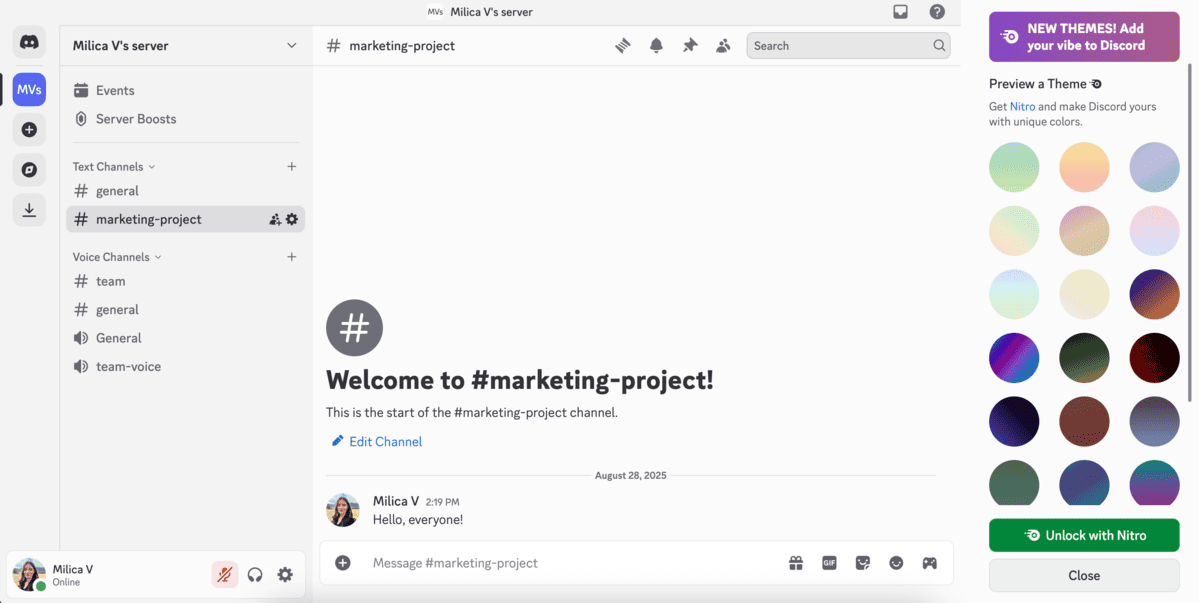
For teams juggling multiple projects, the ability to navigate between channels is invaluable.
However, the richness of Discord’s interface can also be intimidating. When I first tried Discord, the sidebars and menus felt overwhelming. So, newcomers may find themselves overwhelmed by the sidebar full of servers, icons, and notifications.
As a business, you may need to invest time in onboarding if you want Discord to become a productive space rather than a distraction.
On the other hand, WhatsApp couldn’t be simpler.
When you open the app, you see your chats. Tap one, and you’re in. There are no servers, no channels, and no clutter.
For businesses, this means employees can immediately communicate without needing to learn the tool.
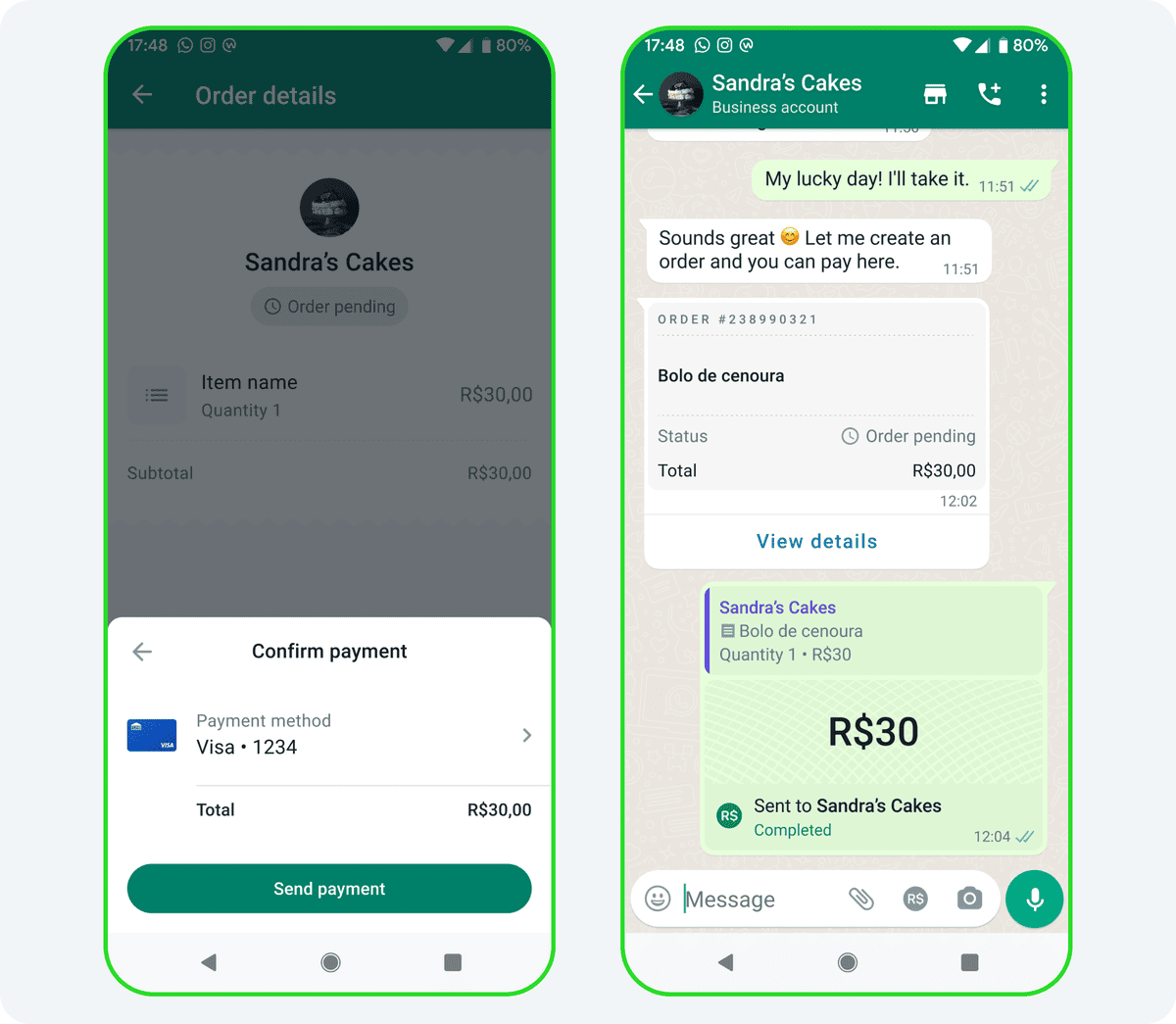
The drawback, of course, is that conversations are linear and unstructured. Important updates are often buried in long feeds, and the lack of separation between topics makes it harder to keep work communication tidy.
In short, Discord offers structure and depth, while WhatsApp offers speed and simplicity. The choice depends on whether your team values organization or accessibility more.
Simple, yet powerful — meet Pumble
Discord vs WhatsApp: Communication features are more advanced in Discord
Communication is the heart of any business tool, and here Discord and WhatsApp diverge even further.
Discord is designed for multimodal communication.
Text chats feel sophisticated, with:
- Threads,
- Reactions,
- Mentions, and
- Pinned messages.
This makes it easier to manage complex conversations.
But the real strength lies in voice and video.
Discord’s voice channels work like virtual meeting rooms — they are always open, and team members can drop in when needed. I don’t need to schedule a formal meeting just to chat with a coworker.
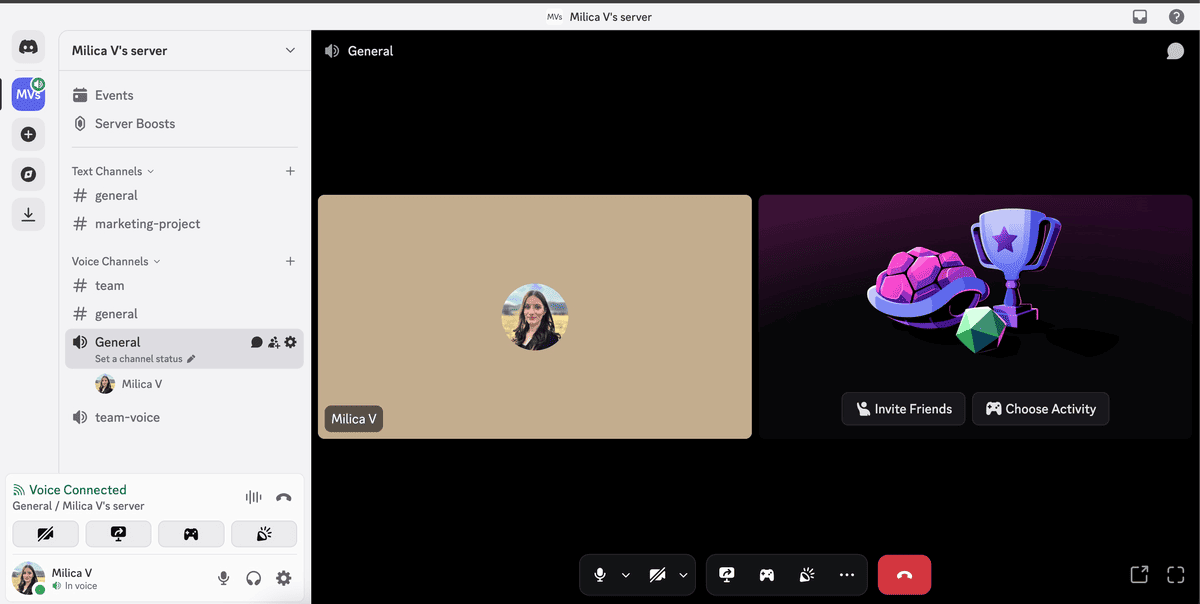
This creates a sense of presence that’s closer to an office environment, where quick side conversations can happen without formal invitations.
Screen sharing during video calls adds another layer of collaboration, making it easy to present slides, review designs, or walk through documents together.
For large-scale company events, Discord even offers Stage channels, which mimic a webinar or town hall format with designated speakers and an audience.
Connect with your team over video calls with Pumble
WhatsApp, in contrast, is laser-focused on immediacy.
Its text messaging is clean and reliable, supporting rich media like:
- Images,
- GIFs, and
- Stickers.
The standout feature for many teams, and myself, is voice notes — quick, informal recordings that replace long paragraphs of text. For teams on the go, this is a time-saver.
WhatsApp also supports voice and video calls, and its reliability on mobile networks is excellent — the quality of calls on WhatsApp is great.
You can also schedule calls and send call links.
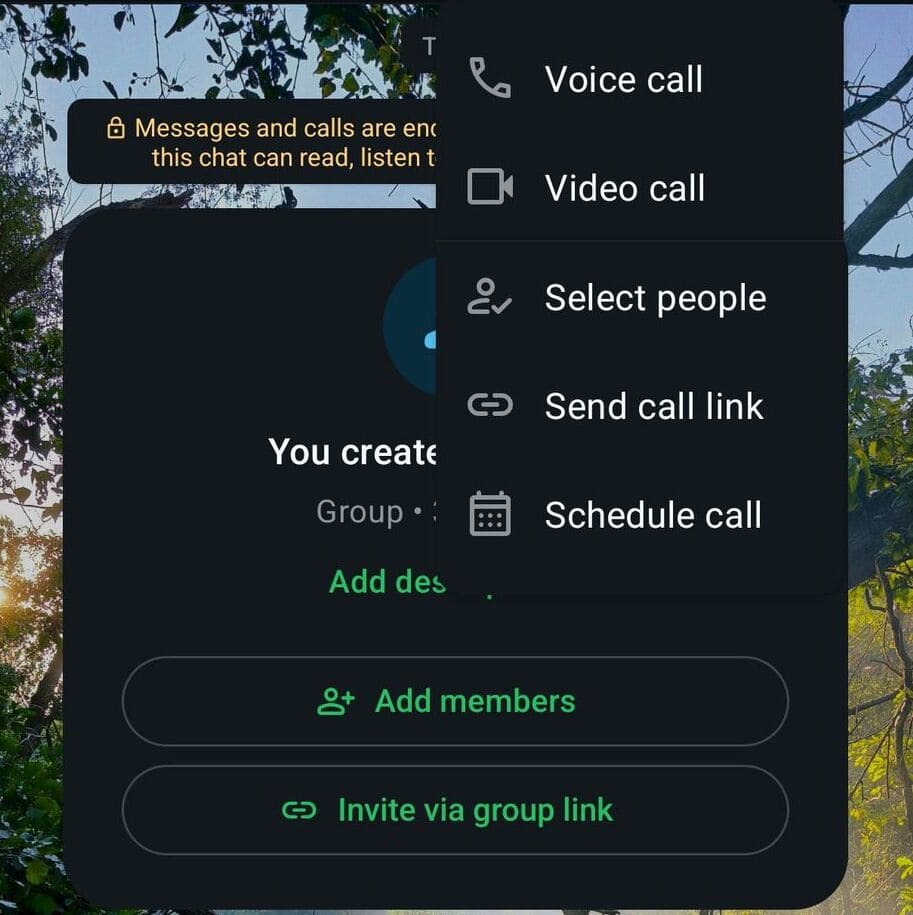
However, it caps group video calls at 32 participants and lacks voice channels, screen sharing, or event-style features. For anything beyond short conversations, it feels limiting.
To put it simply — Discord excels in collaboration-heavy environments, while WhatsApp shines in fast, mobile-first communication.
Experience the best of both worlds with Pumble
Discord vs WhatsApp: Group management is more powerful in Discord
Group communication is where Discord starts to feel built for businesses. Its servers can host thousands of members, each with specific roles and permissions.
Administrators can define exactly who has access to what, whether that means:
- Restricting client channels,
- Creating private leadership spaces, or
- Giving interns read-only access to certain discussions.
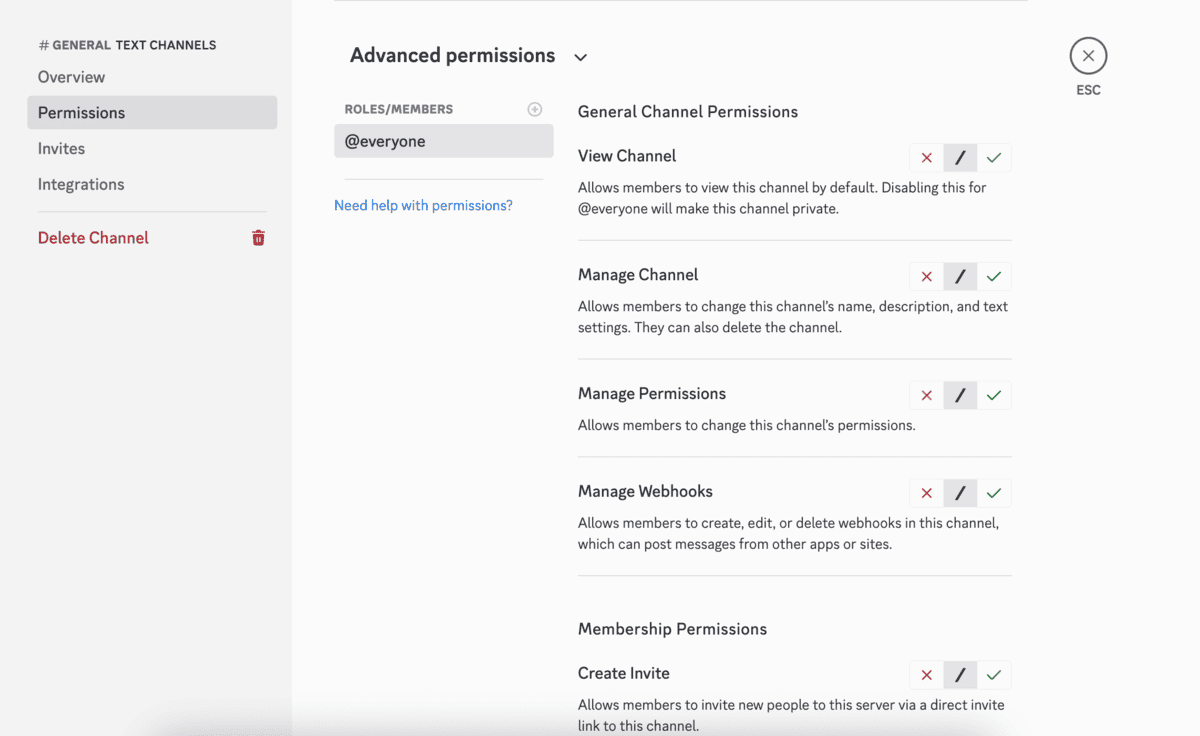
Bots add another layer of power, automating everything from onboarding to task reminders. For distributed or growing teams, this level of control is critical.
WhatsApp’s group system, by comparison, is extremely limited.
Groups max out at 1,024 participants, and everyone shares the same conversation feed.
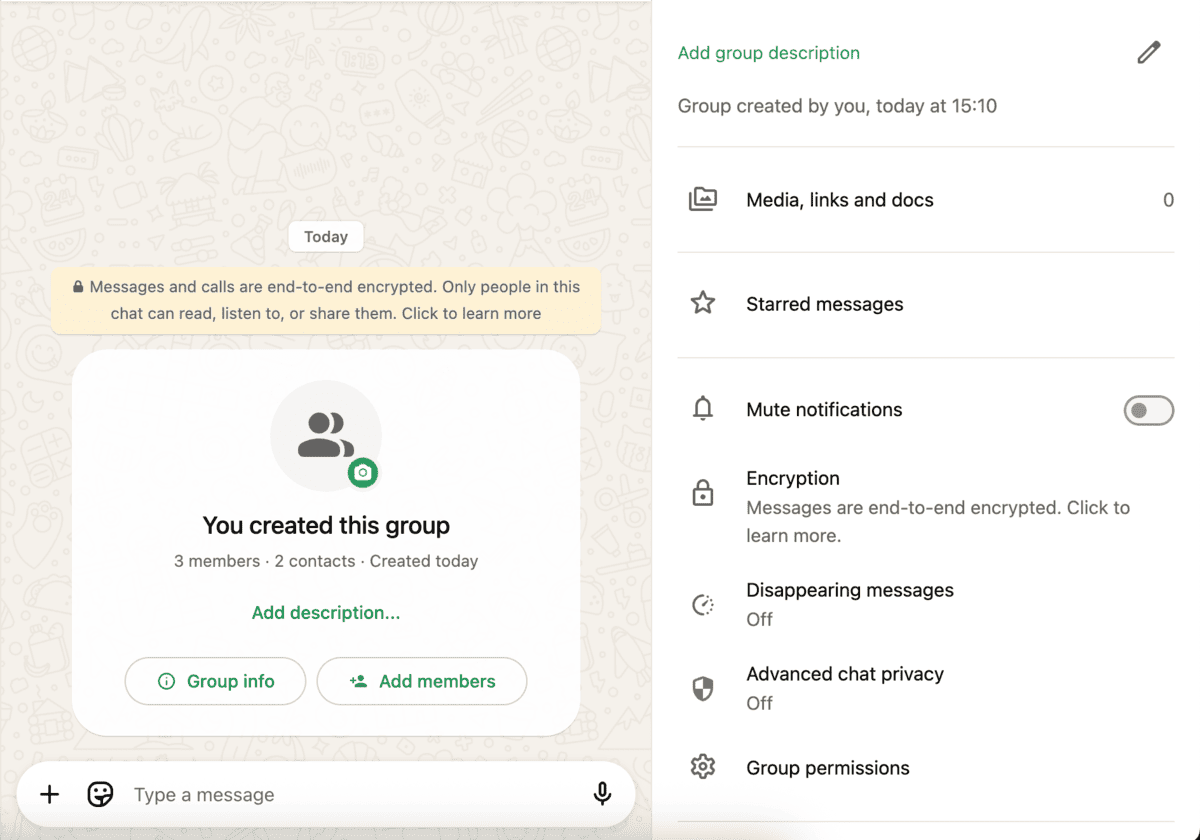
Admins can add or remove people and control who can post, but there are no roles, no advanced permissions, and no subchannels.
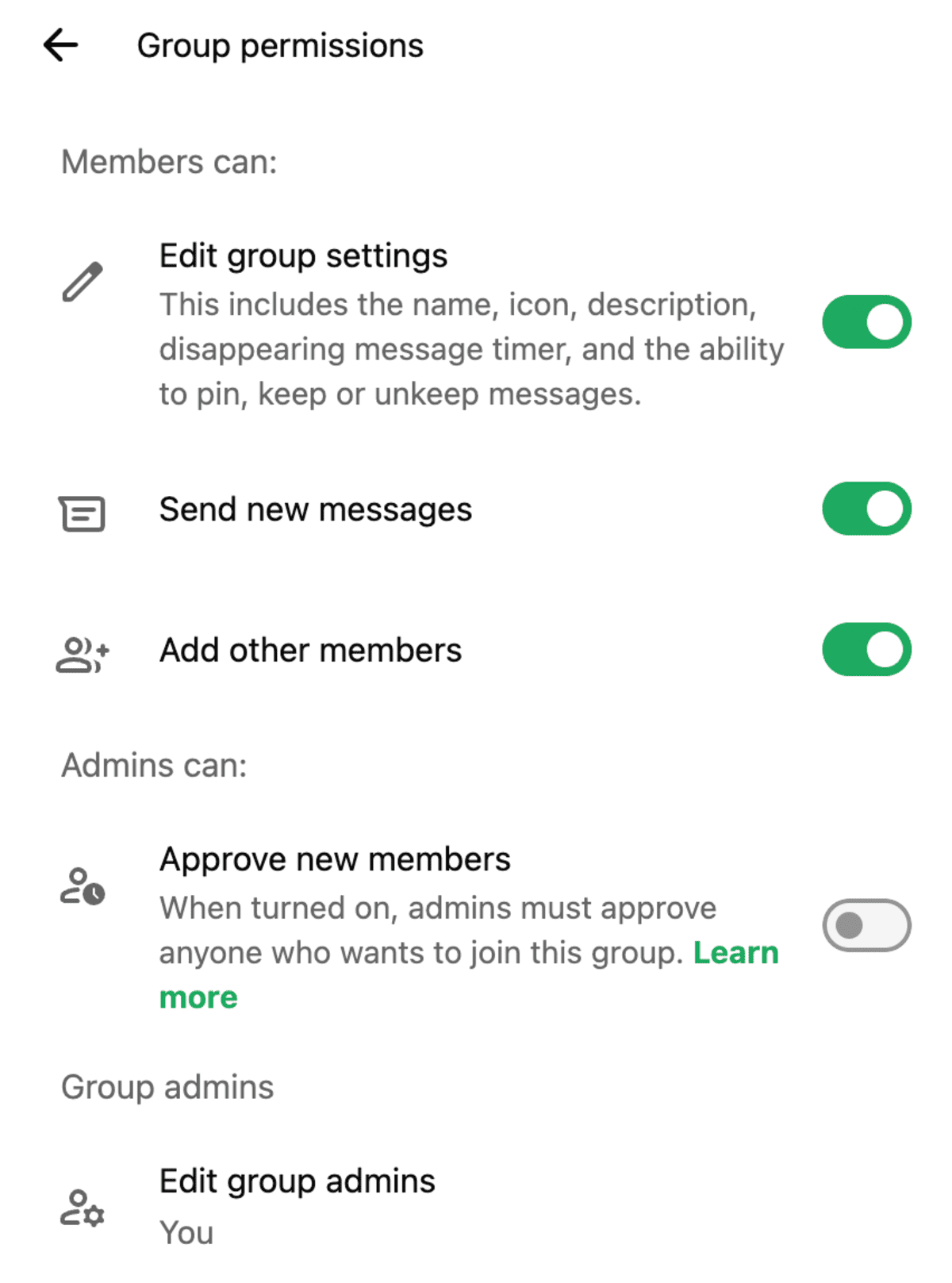
For small teams or departments, that simplicity is fine. In my testing, and with my small team, WhatsApp groups could handle the workload.
But for larger organizations, WhatsApp quickly becomes messy and unmanageable.
Discord is essentially a community platform with business potential, while WhatsApp remains a messaging app with group features.
💡 Pumble Pro Tip
If Discord doesn’t meet all your needs, take a look at some of the best Discord alternatives:
Discord vs WhatsApp: File sharing is less limited in WhatsApp, but clutters private devices
Modern teams exchange files constantly, and here too the apps diverge.
Discord allows users to upload documents, images, and videos directly into channels, where they remain accessible as part of the conversation history.
Free accounts have size limits of up to 8 MB per file, but Nitro subscriptions expand these significantly.
For teams working with design assets, recordings, or other large files, this makes Discord a flexible option. Importantly, files are embedded in the workflow, meaning you can find them later without leaving the chat environment.
WhatsApp supports document sharing as well, with limits of up to 2 GB per file. For most small businesses, this is enough.
However, WhatsApp ties file storage to the user’s device rather than a central workspace. Over time, this clutters personal phones, and because there’s no channel structure, finding an old document usually means scrolling through long chat logs. It works for quick handoffs, not for systematic file management.
I found Discord’s file limit in the free plan very restrictive, so WhatsApp’s 2 GB limit is, in contrast, impressive. However, the fact that, in WhatsApp, I had to save media, files, and documents to my personal device and cram my memory with sometimes unnecessary clutter is a let down.
Share important files and keep them organized in Pumble
Discord vs WhatsApp: Discord’s search options are more advanced
For businesses, conversations aren’t just about the moment — they’re also about creating a record of decisions, agreements, and shared knowledge.
Discord’s search function is very robust. You can filter by keyword, sender, date, or file type, which makes it easy to find that one message with the client’s feedback or the PDF attachment from last quarter’s meeting.
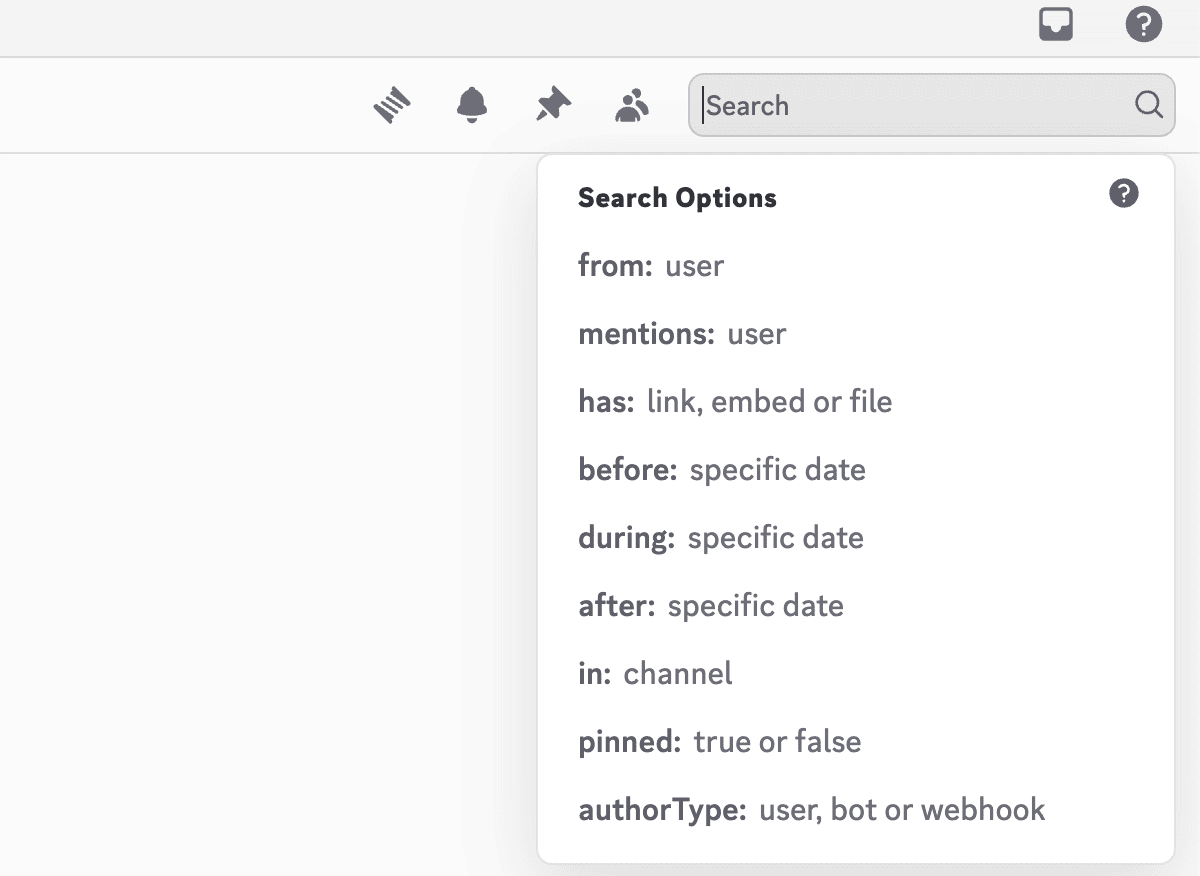
Because servers and channels persist indefinitely, Discord can double as an informal knowledge base. For startups and small companies without a dedicated project management system, this alone is invaluable.
WhatsApp has a search bar too, but it is far less powerful — you can search by date and keyword. I found it accurate when it comes to keyword searches, but you need to remember specific words or parts of sentences to be able to find what you’re looking for.
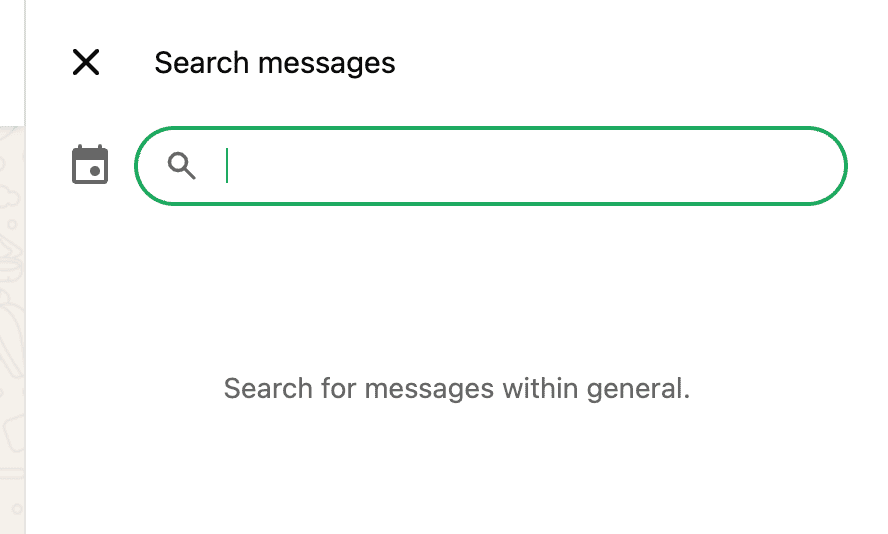
You can also access and search through media, links, and docs in separate spaces, but it’s still not as organized as you would want your business communication to be.
There’s no easy way to organize conversations by project or theme, so knowledge retention becomes inconsistent.
It was challenging to go back to previous discussions if I wasn’t completely sure when they happened or what exactly was said.
Over time, WhatsApp conversations tend to disappear into noise rather than serving as a useful archive.
Unlimited messaging history is free with Pumble
Discord vs WhatsApp: Discord offers more detailed notification customization
Notifications can make or break productivity.
Discord offers granular control. You can:
- Mute entire servers,
- Silence individual channels, or
- Set alerts to only trigger when you are directly mentioned.
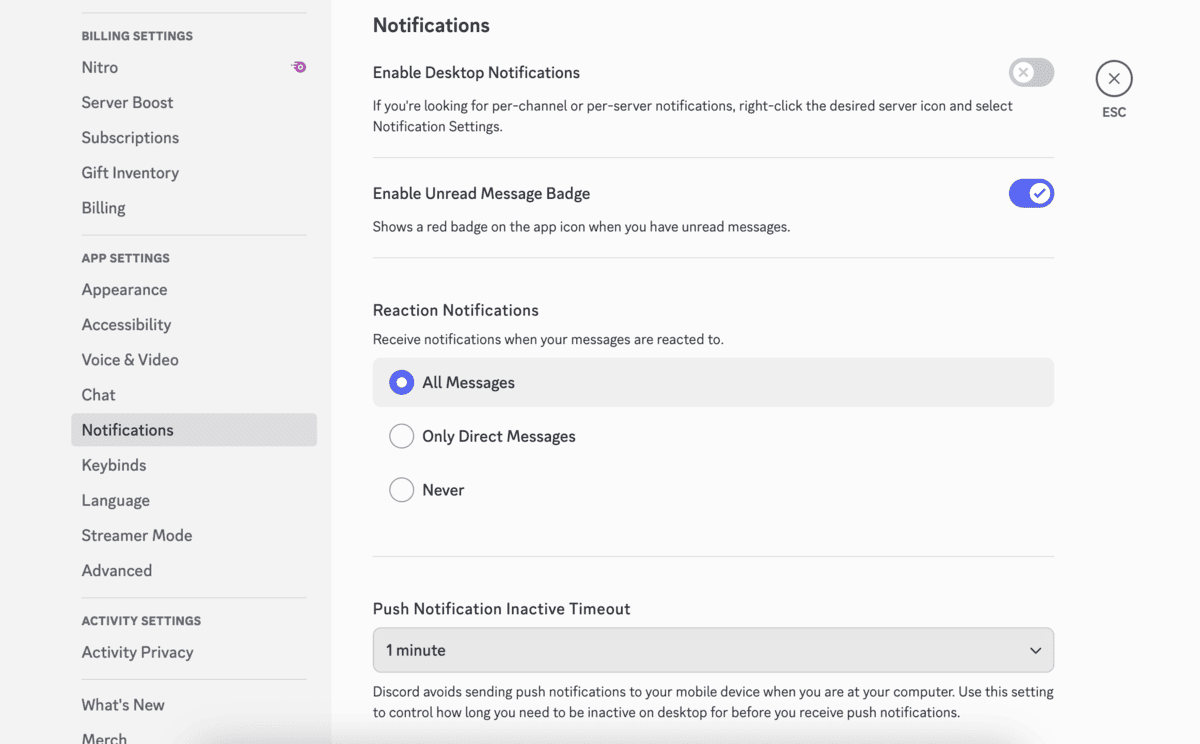
With all of these options, it felt somewhat cluttered at first, but as I got the hang of it, all the toggles and customization options were convenient and useful.
This flexibility can help your employees manage their attention and avoid constant interruptions, though the system can feel overwhelming until it’s configured correctly.
💡 Pumble Pro Tip
If you need an affordable alternative to Discord, made specifically with teams in mind, take a look at our comparison blog post:
WhatsApp takes the opposite route — notifications are straightforward. Every new message pings you unless you mute a chat.
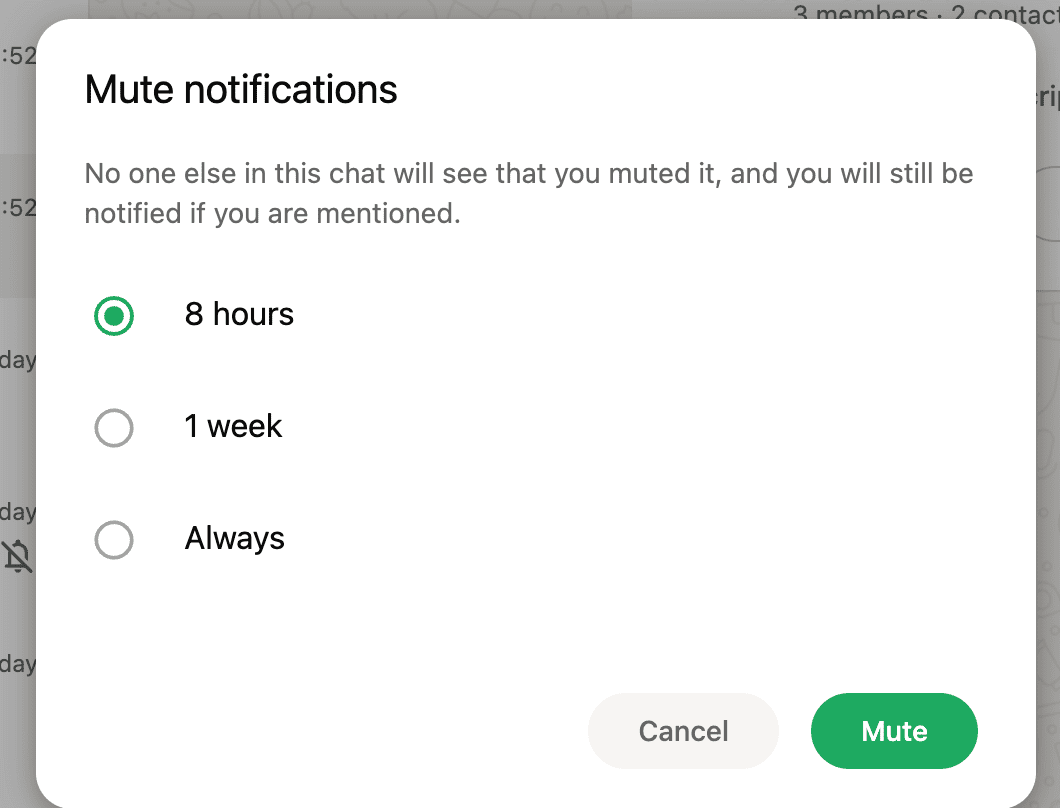
You can also mute all new messages and toggle notification sounds.
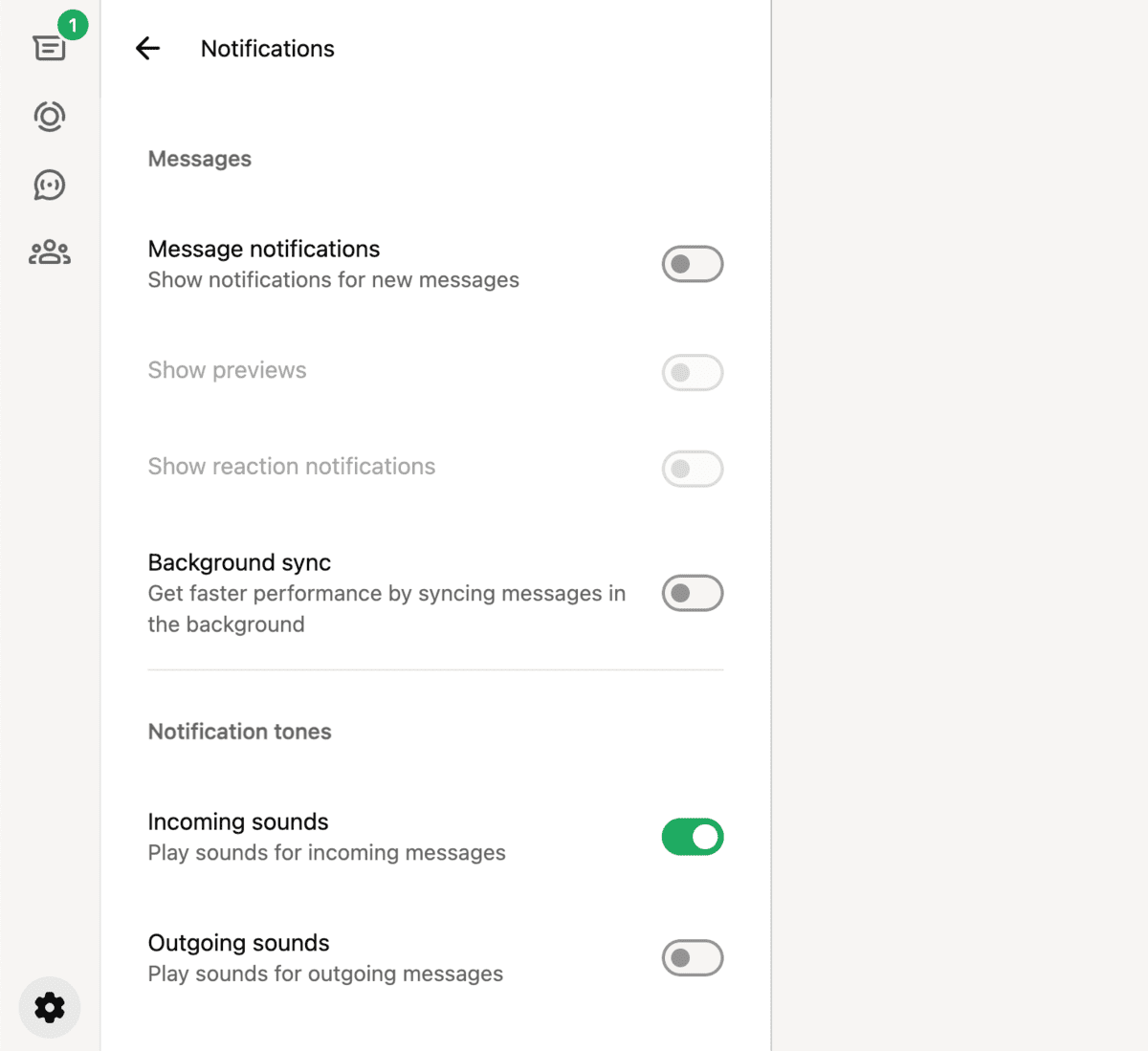
Notification customization in WhatsApp felt underwhelming after Discord’s numerous options.
For small teams, this simplicity works — you’re always alerted, nothing is missed. But for larger groups, it becomes disruptive.
Without layers of control, employees often drown in pings from active chats, creating a cycle of distraction.
Discord vs WhatsApp: Security is stronger in WhatsApp, but administration is better in Discord
When it comes to business communication, trust is as important as convenience.
WhatsApp’s biggest advantage is end-to-end encryption, which protects all messages, calls, and file transfers by default. This makes it a strong choice for businesses handling sensitive information, from contracts to client details.
However, WhatsApp’s business support is limited. The WhatsApp Business App adds some useful tools like auto-replies and labels, and the WhatsApp Business API allows larger companies to connect with customers at scale, but internal IT support options are minimal.
On the other hand, Discord does not provide end-to-end encryption.
Instead, it encrypts data in transit and at rest, which is secure but not as airtight as WhatsApp’s model. For businesses in highly regulated industries, this may be a dealbreaker.
That said, Discord offers detailed administrative controls within servers, allowing companies to manage who sees what, which can reduce internal risk.
In terms of support, Discord provides help documentation and community forums but lacks enterprise-grade service levels.
In short — WhatsApp wins on encryption, Discord wins on administrative control, but neither is a perfect enterprise solution.
Try a secure business messaging tool, Pumble
Verdict: Discord is better for large communities, WhatsApp is better for smaller teams
After testing both, I’d say it depends entirely on the type of communication you value.
When I needed speed, simplicity, and security — like sending a quick update to a client or coordinating with a small remote team — WhatsApp was unbeatable. Everyone already had it, nobody needed training, and end-to-end encryption kept everything private.
When I needed structured collaboration — like managing projects across multiple departments or running ongoing discussions — Discord was the clear winner. The server and channel setup made it possible to organize conversations in ways WhatsApp simply couldn’t. Add in voice channels, screen sharing, and better search, and Discord felt like a digital HQ rather than just a chat app.
To sum up, let’s answer some frequently asked questions about the differences between Discord and WhatsApp.
Is Discord better than WhatsApp for large groups?
Yes. Discord supports servers with thousands of members, organized into channels, while WhatsApp caps group chats at 1,024 participants with no channel system.
Is Discord more secure than WhatsApp?
Not exactly. WhatsApp uses end-to-end encryption by default, which makes personal chats very secure. Discord encrypts data in transit but doesn’t offer end-to-end encryption.
What are the main differences between Discord and WhatsApp?
Discord is community focused, with servers, channels, and collaboration features. WhatsApp is focused on direct messaging, and designed for personal or small group communication.
Which app has better quality calls, Discord or WhatsApp?
Discord generally has better quality calls with more features such as screen sharing and reactions. WhatsApp calls are reliable but more basic.
Can I use Discord for work instead of WhatsApp?
Yes. Discord offers voice, video, channels, file sharing, and integrations, which make it suitable for teamwork. WhatsApp is better for quick, direct updates with clients or colleagues.
My advice — use WhatsApp for fast communication within small teams, and Discord for company-wide collaboration.
However, these two apps are not your only options.
Need a business-ready alternative? Try Pumble by CAKE.com
After all my testing, though, I kept circling back to the same thought — neither Discord nor WhatsApp was truly built for business. They’re adapted tools.
Pumble by CAKE.com, a business collaboration and communication tool, combines the strengths of both apps without their weaknesses.
Just like Discord, it gives me channels, searchable archives, and structured organization.
Like WhatsApp, it stays clean, simple, and mobile-friendly.
Pumble was actually designed for teams from day one, with a professional interface and business-centric features such as:
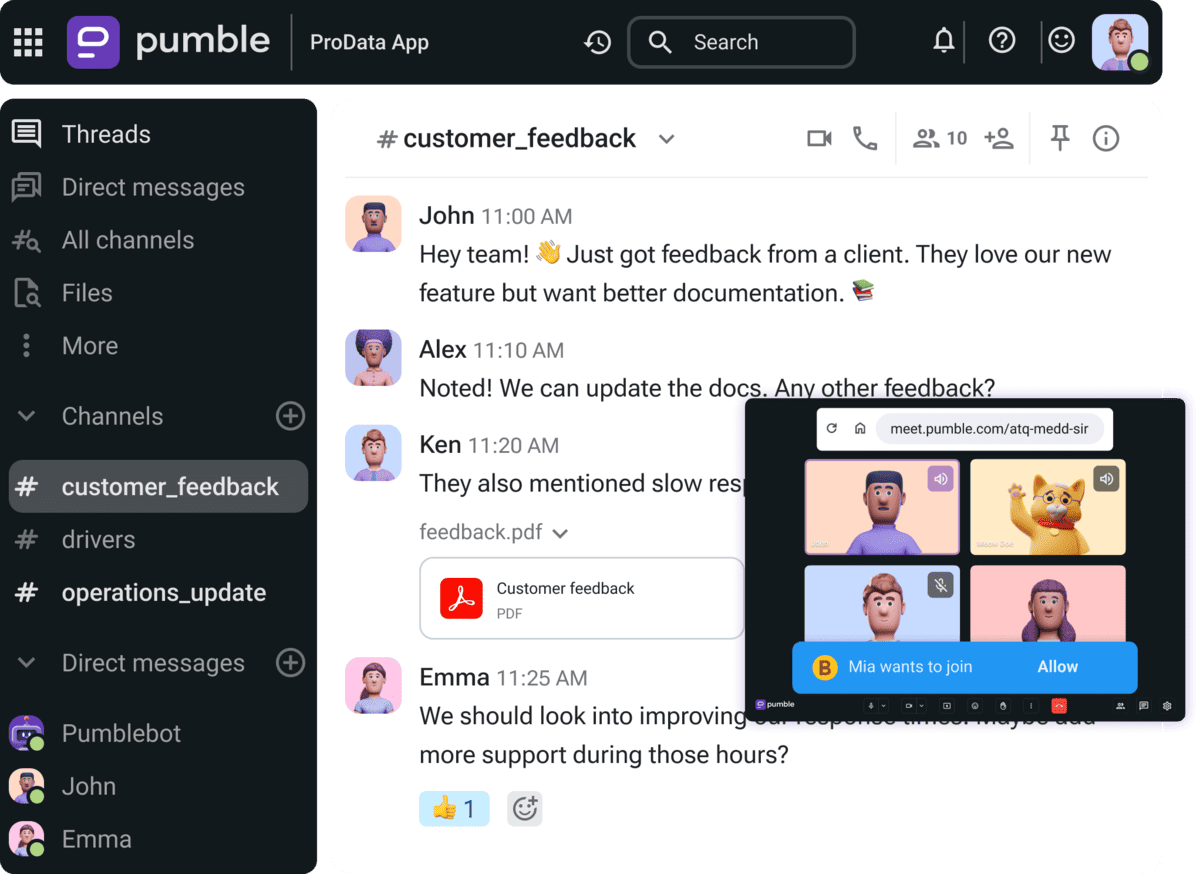
Furthermore, unlimited message history, unlimited users, and reliable file sharing make Pumble feel tailored to how businesses actually work.
So, stop using apps that limit you and switch to a tool made with teams in mind.


